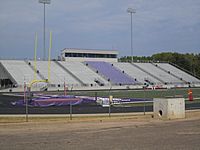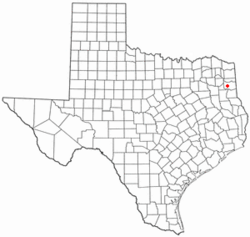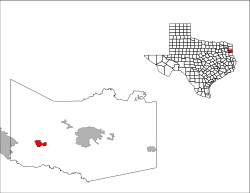Hallsville, Texas facts for kids
Quick facts for kids
Hallsville, Texas
|
|
|---|---|

Bobcat Stadium at Hallsville Junior High
|
|

Location of Hallsville, Texas
|
|
 |
|
| Country | United States |
| State | Texas |
| County | Harrison |
| Area | |
| • Total | 3.81 sq mi (9.86 km2) |
| • Land | 3.81 sq mi (9.86 km2) |
| • Water | 0.00 sq mi (0.00 km2) |
| Elevation | 364 ft (111 m) |
| Population
(2020)
|
|
| • Total | 4,277 |
| • Density | 1,128.74/sq mi (435.82/km2) |
| Time zone | UTC-6 (Central (CST)) |
| • Summer (DST) | UTC-5 (CDT) |
| ZIP code |
75650
|
| Area code(s) | 903, 430 |
| FIPS code | 48-31904 |
| GNIS feature ID | 2410689 |

Hallsville is a city in Harrison County, Texas, United States. It is about 13 miles west of Marshall, the county seat. Hallsville is located along U.S. Highway 80. In 2020, the city had a population of 4,277 people.
Contents
Hallsville's History
Early Settlement and Growth
Hallsville began in 1839. It was first a fort called Fort Crawford. W. C. Crawford built it to protect against Native Americans. By 1849, the fort had a post office and a building used as a church, Masonic hall, and school. This was the only school in western Harrison County for many years.
In 1869, a new railroad line was built. It crossed about a mile north of Fort Crawford. The people living at the fort moved to be closer to the railroad. They named their new town Hallville after a railroad official. The original fort location is now just a cemetery.
The first post office in the new Hallville opened in 1869. The first business was a saloon. From 1869 to 1872, Hallville was the end of the railroad line. The railroad company built offices and workshops there. The town officially became a city in 1870. It grew very quickly, becoming a "boom town" with many businesses. Hallville was a busy place for shipping cotton, wool, and animal hides.
Changes and Rebuilding
In 1872, a different railroad company took over. They extended the railroad further west to Longview. This meant Hallville lost much of its trade. In 1873, the railroad moved its main offices and shops to Marshall. Hallville's city status ended, and many people moved away to Marshall.
By 1884, Hallville had about 600 people. It had churches, sawmills, and other businesses. The population dropped to 300 by 1892 but grew back to 600 in the early 1900s. In 1904, the Hallville school district had schools for both white and Black students. A bank opened in 1909. In the 1920s, the post office changed the town's name to Hallsville. The community officially became a city again in 1935.
Hallsville Today
For a long time, Hallsville had only one traffic light. This was at the main intersection of Highway 80 and FM 450. In recent years, the town has grown a lot. It now has more traffic lights, a large grocery store, medical and dental clinics, and several fast-food restaurants. The schools and their events, especially sports, are still a very important part of the community.
Hallsville's Location
Hallsville is in the western part of Harrison County. U.S. Highway 80 runs through the middle of town. This road goes east to Marshall, which is 13 miles away. It goes west to Longview, which is 10 miles away.
Another important road, Farm to Market Road 450, goes south from Hallsville for 2 miles to Interstate 20. It also goes north for 13 miles to Harleton.
The United States Census Bureau says Hallsville covers about 3.8 square miles (9.6 square kilometers) of land. There is no water area within the city limits.
People of Hallsville
| Historical population | |||
|---|---|---|---|
| Census | Pop. | %± | |
| 1880 | 179 | — | |
| 1950 | 617 | — | |
| 1960 | 684 | 10.9% | |
| 1970 | 1,038 | 51.8% | |
| 1980 | 1,556 | 49.9% | |
| 1990 | 2,288 | 47.0% | |
| 2000 | 2,772 | 21.2% | |
| 2010 | 3,577 | 29.0% | |
| 2020 | 4,277 | 19.6% | |
| U.S. Decennial Census | |||
| Race | Number | Percentage |
|---|---|---|
| White (NH) | 3,236 | 75.66% |
| Black or African American (NH) | 403 | 9.42% |
| Native American or Alaska Native (NH) | 19 | 0.44% |
| Asian (NH) | 50 | 1.17% |
| Pacific Islander (NH) | 2 | 0.05% |
| Some Other Race (NH) | 19 | 0.44% |
| Mixed/Multi-Racial (NH) | 198 | 4.63% |
| Hispanic or Latino | 350 | 8.18% |
| Total | 4,277 |
In 2020, Hallsville had 4,277 people living there. There were 1,564 households and 1,233 families.
In 2010, the average age of people in Hallsville was 32 years old. Most of the people were white (89.1%). About 5.5% were Black or African American. About 6.1% of the population was Hispanic or Latino.
In 2000, there were 2,772 people in Hallsville. About 33.2% of the population was under 18 years old. The median income for a family was about $49,868 per year.
Local Media
Bobcat Radio
Hallsville has its own radio station called Bobcat Radio 104.9 KQAT. The Hallsville Independent School District owns and runs it. This low-power FM (LPFM) station provides information to Hallsville and the surrounding area. You can also listen to Bobcat Radio online.
Education
The Hallsville Independent School District serves the city. This district is responsible for the schools in Hallsville.
Famous People from Hallsville
Many notable people have connections to Hallsville:
- James M. Collins – A U.S. Representative from Texas.
- Clint Ingram – A former NFL football player for the Jacksonville Jaguars.
- Harry Kinzy – A former MLB baseball pitcher for the Chicago White Sox.
- Roddrick Muckelroy – A former NFL football player for the Washington Redskins.
- Robert Newhouse – A former NFL football player for the Dallas Cowboys.
- Robert Manley Parker – A retired federal judge.
Hallsville's Climate
Hallsville has a climate with hot, humid summers. The winters are usually mild to cool. This type of weather is called a humid subtropical climate. It is often shown as "Cfa" on climate maps.
See also
 In Spanish: Hallsville (Texas) para niños
In Spanish: Hallsville (Texas) para niños
 | Mary Eliza Mahoney |
 | Susie King Taylor |
 | Ida Gray |
 | Eliza Ann Grier |


